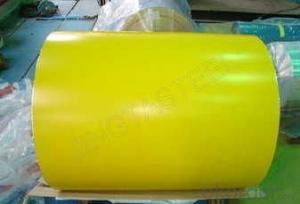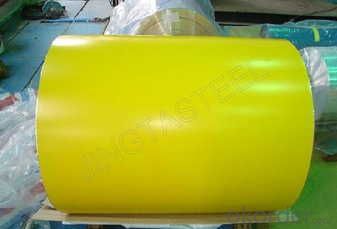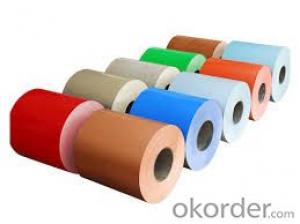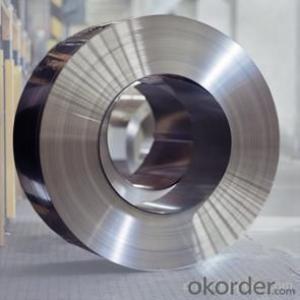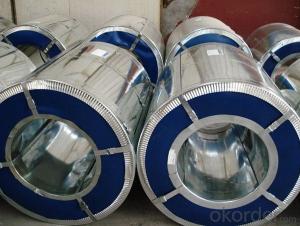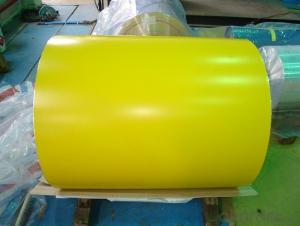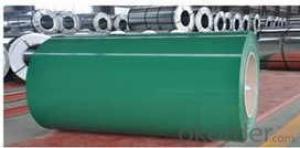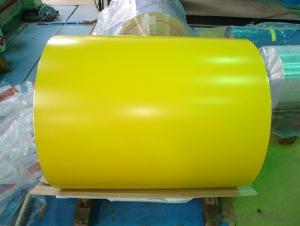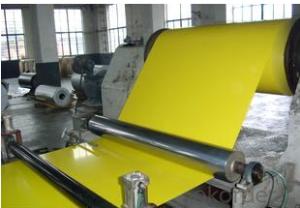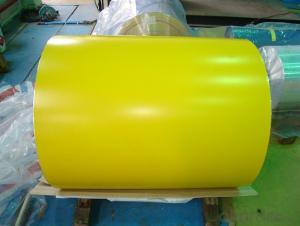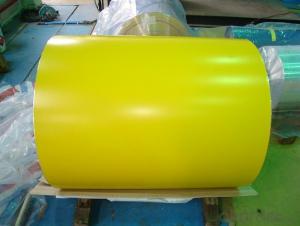EXCELLENT COLOR COATED STEEL COIL YELLOW
- Loading Port:
- China Main Port
- Payment Terms:
- TT OR LC
- Min Order Qty:
- -
- Supply Capability:
- -
OKorder Service Pledge
OKorder Financial Service
You Might Also Like
EXCELLENT COLOR COATED STEEL COIL-YELLOW 2) Standard: JIS G3302, JIS G3312, ASTM A653M/A924M 1998 | |||||
3) Grade: Q195-Q235 and SPCC, SPCD, SPCE, SGCC (DX51D+Z) SGCD (DX52D+Z), etc. | |||||
4) Thickness: 0.25mm-1.5mm | |||||
5) Zinc coating weight: 60g/m2-275g/m2 | |||||
6) Width: 750mm-1250mm, or according to the customer's request | |||||
7) Coil ID: 508mm-610mm | |||||
8) Coil Weight: according to the customer's request | |||||
9) Color: RAL, or other series | |||||
10) Surface protection: PE, PVDF, SMP, HDP, etc. | |||||
11) Surface treatment: chromate, oil/unoil, bright finish, spangle, anti-finger print | |||||
12) Min trial order: 20 tons each size, 1x20' per delivery | |||||
| | | | | | |
| | | | | | |
| | | | | | |
Applications : | |||||
1. Contruction and building: roofing; ventilating duct; handrail; partition panel;etc. | |||||
2. Electric appliance: refrigerator; washing machine; refrigerator; DVD;etc. | |||||
3.Transportation: oil tank; road sign; etc. | |||||
4.Agriculture:barn; etc. | |||||
5.Others:vending machine; game machine; etc. | |||||
Advantages:
1. Low MOQ:It can meet your promotional business very well.
2. Good Service:We treat customers as our friends
3. Good Quality: We have strict quality control system; don’t sell the poor quality goods
4. Best price: Choosing superior resources from more than five factories for you
5. Fast & Cheap Delivery:We have big discount from forwarder
- Q: I have been searching on pots and pans, how can I find out if it's really stainless steel, someone told me if a magnet sticks to it it's real stainless steel is this true?
- if a magnet sticks to it that means it's a cheaper metal coated with stainless steel. if it's an appliance you're buying, look on the reciept. real stainless steel will actually say it. the coated stuff will just say stainless leaving out the steel.
- Q: Can steel coils be recycled?
- Yes, steel coils can be recycled. Steel is a highly recyclable material, and the recycling process for steel coils involves melting them down and reshaping them into new products. This helps conserve natural resources, reduce energy consumption, and minimize waste.
- Q: What are the common industry standards for steel coils?
- Steel coils in the industry have varying standards depending on the region and specific use. However, there are widely accepted standards used in the steel industry. Among the most frequently used standards for steel coils is the American Society for Testing and Materials (ASTM) standard. ASTM has created various specifications for different types of steel coils, including hot-rolled, cold-rolled, and galvanized coils. These specifications outline the mechanical and chemical properties that the steel must meet, as well as dimensions, tolerances, and testing requirements. Apart from ASTM, international organizations like the International Organization for Standardization (ISO) and the European Committee for Standardization (EN) have also established standards for steel coils. ISO standards, such as ISO 3574 and ISO 5952, offer guidelines for general requirements, dimensional tolerances, and mechanical properties of steel coils. Similarly, EN standards like EN 10130 and EN 10131 specify the characteristics and tolerances for cold-rolled steel coils. Moreover, industry-specific organizations and associations may have their own standards for steel coils. For instance, the American Iron and Steel Institute (AISI) has developed specific standards for various steel products, including coils. These standards cover aspects including chemical composition, mechanical properties, and surface finish. It's worth noting that steel coil standards can also be determined by the intended use. Industries like automotive, construction, and manufacturing may have specific requirements that surpass general standards. In such cases, customers and manufacturers may refer to industry-specific standards or collaborate to define custom specifications. In summary, while there are several common industry standards for steel coils, it is crucial to consult the specific standards and requirements applicable to the region and application in question to ensure compliance and quality.
- Q: I would like to buy a new cold steel recon 1 folding knife. My concern is the knife is made in Taiwan, will the quality of blade/overall make is lower quality compare with those made in US/JAPAN? The plan is use as an EDC, any good suggestion with similar style? Most important to me is reliability, 2)sharpness, 3) maintance than 4)cost. Anyone can point me into right direction? Please share, Thanks in advance.
- I recently bought the same weapon and am really impressed. There is no decline in quality and it arrived sharp enough to shave with. I rank upon the finer knives that I own. I would not hesitate to use it in a defensive situation (or offensive).
- Q: What are the different methods of cutting steel coils into sheets?
- There are several methods of cutting steel coils into sheets, including shearing, slitting, and laser cutting. Shearing involves a straight blade that cuts through the coil to create individual sheets. Slitting uses circular knives to cut the coil into narrower strips, which are then further processed into sheets. Laser cutting uses a high-powered laser beam to precisely cut the coil into sheets, providing more flexibility in terms of shapes and sizes.
- Q: How can steel coils be recycled?
- Steel coils can be recycled by first removing any contaminants or coatings from the surface. The coils are then shredded into smaller pieces and melted in a furnace. The molten steel is then formed into new coils or other steel products.
- Q: What are the different types of steel coil surface treatments for outdoor applications?
- There are several types of steel coil surface treatments suitable for outdoor applications. These include galvanization, which involves coating the steel with a layer of zinc to protect against corrosion; zinc-aluminum alloy coating, which provides enhanced corrosion resistance; paint coating, which adds a layer of protective paint to the steel surface; and organic coating, which uses a polymer-based material to protect against weathering and corrosion.
- Q: What are the different coil cutting machine options available for steel coils?
- There are several coil cutting machine options available for steel coils, including slitting machines, cut-to-length machines, and blanking machines. Slitting machines are used to cut the steel coils into narrower strips, while cut-to-length machines are designed to cut the coils into specific lengths. Blanking machines, on the other hand, are used to cut the steel coils into various shapes and sizes. These coil cutting machines offer different capabilities and can be chosen based on the specific requirements of the steel coil cutting process.
- Q: How are steel coils used in the manufacturing of airbags?
- Steel coils are used in the manufacturing of airbags to provide stability and structure. These coils are typically placed inside the airbag module to ensure proper deployment and inflation during a collision. The steel coils help maintain the desired shape and prevent the airbag from collapsing, allowing it to effectively protect the occupants of a vehicle in the event of a crash.
- Q: How are steel coils used in the manufacturing of railway bridges?
- Steel coils are used in the manufacturing of railway bridges as they are formed and shaped into structural elements such as beams, girders, and plates. These steel components provide the necessary strength, durability, and load-bearing capacity to support the weight of trains and ensure the structural integrity of the bridge.
Send your message to us
EXCELLENT COLOR COATED STEEL COIL YELLOW
- Loading Port:
- China Main Port
- Payment Terms:
- TT OR LC
- Min Order Qty:
- -
- Supply Capability:
- -
OKorder Service Pledge
OKorder Financial Service
Similar products
Hot products
Hot Searches
Related keywords
